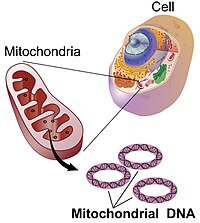
Photo from wikipedia
Plastid engineering has several unique advantages such as high expression of transgene due to high polyploid of plastid genome and environmental biosafety because of maternal inheritance of transgene, and becomes… Click to show full abstract
Plastid engineering has several unique advantages such as high expression of transgene due to high polyploid of plastid genome and environmental biosafety because of maternal inheritance of transgene, and becomes a promising tool for molecular farming, metabolic engineering and genetic improvement. However, there were no standard vectors available for plastid transformation. Moreover, the construction of plastid transformation vectors containing long operons or genes encoding proteins that are toxic to Escherichia coli was tedious or unclonable. Here, we developed a simple plastid transformation technology without need for in vitro vector construction while by using multiple linear DNA fragments, which share homologous sequences (HSs) at their ends. The strategy is based on homologous recombination between HSs of DNA fragments via endogenous recombination machinery in plastids, which subsequently are integrated into plastid genome. We found that HSs of 200 bp or longer were sufficient for mediating the integration into plastid genome at least similar efficiency to that of plasmid DNA-based plastid transformation. Furthermore, we successfully used this method to introduce a phage lysin-encoding gene and a long operon into tobacco plastid genome. The establishment of this technology simplifies plastid transformation procedure and provides a novel solution for expressing proteins which are toxic to cloning host and large operon in plastid without need of vector cloning.
Journal Title: Journal of experimental botany
Year Published: 2022
Link to full text (if available)
Share on Social Media: Sign Up to like & get
recommendations!